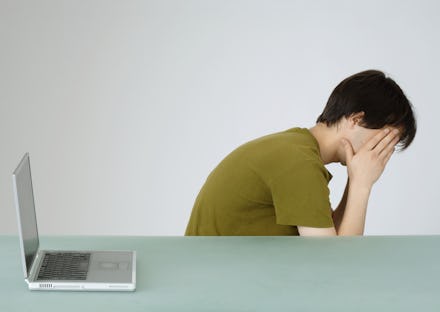If You Check Social Media a Lot, You're More Likely to Be Depressed

Here's another good reason to put down your phone — besides, you know, neck wrinkles.
Young adults who spend more time on social media are more likely to have depression, researchers at the University of Pittsburgh have found.
While previous mental health research has focused on specific social media outlets — such as this 2014 study linking Facebook and depression — these findings encompass a broad range of platforms, including Facebook, Twitter, Instagram, Snapchat, Reddit, Tumblr and Vine.
To reach their findings, researchers asked 1,787 U.S. adults ages 19 to 32 to fill out a questionnaire about their overall social media use. They also established a system to assess participants' depression levels, according to a press release.
Test subjects, on average, spent 61 minutes per day on social media, and checked various social media accounts 30 times per week, according to the release. But it's important to remember these results are self-reported, meaning subjects could have played down the amount of time they really spend searching for baby goat videos on Instagram.
The connection to depression: People who spent more total time on social media and who checked their accounts more frequently were more likely to have depression, the researchers found.
Folks who reported spending more time on social media were 2.7 times more likely to be depressed, while those who said they checked their accounts more often were 1.7 times more likely to be depressed. The researchers controlled for other potential depression-causing factors, including relationship status and income level.
That's not to say social media causes depression (though anyone who's glimpsed the dark corners of Reddit, or been subjected to Twitter harassment, may beg to differ). "It may be that people who already are depressed are turning to social media to fill a void," lead author Lui yi Lin said in the release.
Therapists know it's happening. "This study is providing yet more evidence that there is a significant interplay with depression and social media use," Nicole Amesbury, therapist and head of clinical development for the service Talkspace, said in an email. Talkspace last year launched a designated 12-week program to help people use social media in healthier ways.
"A common thing that people do when they start to become depressed is to isolate more," Amesbury said. "Social media provides an opportunity to watch our social relationships — turning inward and not being a full participant. It is a risky thing to do when feeling depressed."
The researchers hope their findings will encourage mental health providers to talk with their clients about social media use, as well as spur public health initiatives on social media platforms themselves.
The potential mental health effects of social media are much more serious than "FOMO or envy," Amesbury cautioned.
"It is time to look deeply into social media's impact on the phenomenology of emotion," she said. "From my work with patients, I can say that their experiences with social media are more profound and meaningful than what is commonly discussed."